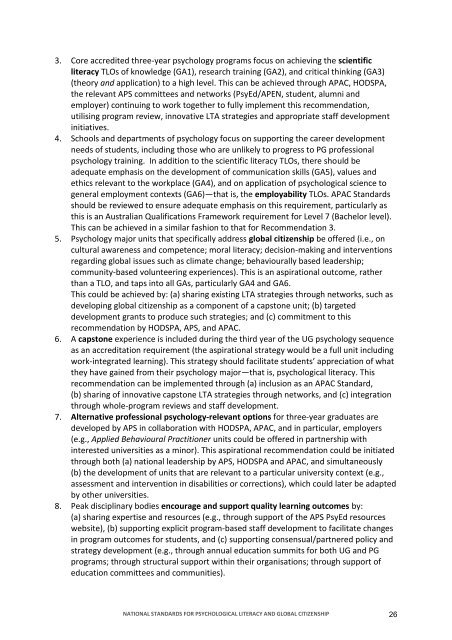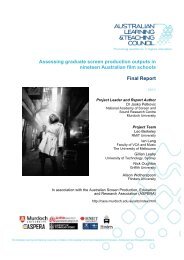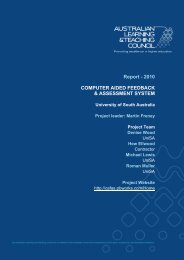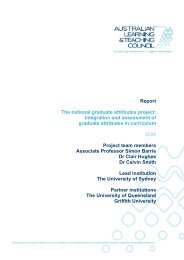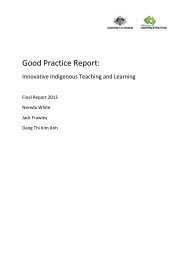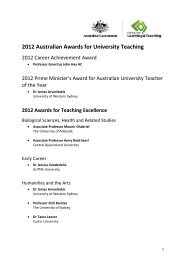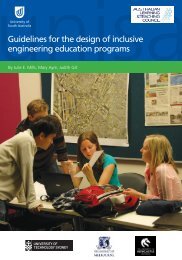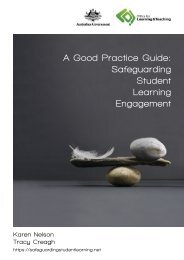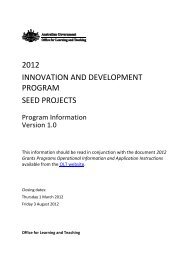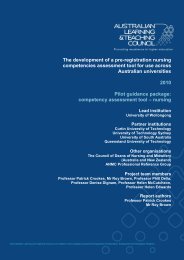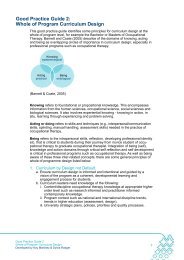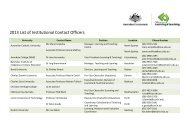national standards for psychological literacy and global citizenship
national standards for psychological literacy and global citizenship
national standards for psychological literacy and global citizenship
Create successful ePaper yourself
Turn your PDF publications into a flip-book with our unique Google optimized e-Paper software.
3. Core accredited three-year psychology programs focus on achieving the scientific<br />
<strong>literacy</strong> TLOs of knowledge (GA1), research training (GA2), <strong>and</strong> critical thinking (GA3)<br />
(theory <strong>and</strong> application) to a high level. This can be achieved through APAC, HODSPA,<br />
the relevant APS committees <strong>and</strong> networks (PsyEd/APEN, student, alumni <strong>and</strong><br />
employer) continuing to work together to fully implement this recommendation,<br />
utilising program review, innovative LTA strategies <strong>and</strong> appropriate staff development<br />
initiatives.<br />
4. Schools <strong>and</strong> departments of psychology focus on supporting the career development<br />
needs of students, including those who are unlikely to progress to PG professional<br />
psychology training. In addition to the scientific <strong>literacy</strong> TLOs, there should be<br />
adequate emphasis on the development of communication skills (GA5), values <strong>and</strong><br />
ethics relevant to the workplace (GA4), <strong>and</strong> on application of <strong>psychological</strong> science to<br />
general employment contexts (GA6)—that is, the employability TLOs. APAC St<strong>and</strong>ards<br />
should be reviewed to ensure adequate emphasis on this requirement, particularly as<br />
this is an Australian Qualifications Framework requirement <strong>for</strong> Level 7 (Bachelor level).<br />
This can be achieved in a similar fashion to that <strong>for</strong> Recommendation 3.<br />
5. Psychology major units that specifically address <strong>global</strong> <strong>citizenship</strong> be offered (i.e., on<br />
cultural awareness <strong>and</strong> competence; moral <strong>literacy</strong>; decision-making <strong>and</strong> interventions<br />
regarding <strong>global</strong> issues such as climate change; behaviourally based leadership;<br />
community-based volunteering experiences). This is an aspirational outcome, rather<br />
than a TLO, <strong>and</strong> taps into all GAs, particularly GA4 <strong>and</strong> GA6.<br />
This could be achieved by: (a) sharing existing LTA strategies through networks, such as<br />
developing <strong>global</strong> <strong>citizenship</strong> as a component of a capstone unit; (b) targeted<br />
development grants to produce such strategies; <strong>and</strong> (c) commitment to this<br />
recommendation by HODSPA, APS, <strong>and</strong> APAC.<br />
6. A capstone experience is included during the third year of the UG psychology sequence<br />
as an accreditation requirement (the aspirational strategy would be a full unit including<br />
work-integrated learning). This strategy should facilitate students’ appreciation of what<br />
they have gained from their psychology major—that is, <strong>psychological</strong> <strong>literacy</strong>. This<br />
recommendation can be implemented through (a) inclusion as an APAC St<strong>and</strong>ard,<br />
(b) sharing of innovative capstone LTA strategies through networks, <strong>and</strong> (c) integration<br />
through whole-program reviews <strong>and</strong> staff development.<br />
7. Alternative professional psychology-relevant options <strong>for</strong> three-year graduates are<br />
developed by APS in collaboration with HODSPA, APAC, <strong>and</strong> in particular, employers<br />
(e.g., Applied Behavioural Practitioner units could be offered in partnership with<br />
interested universities as a minor). This aspirational recommendation could be initiated<br />
through both (a) <strong>national</strong> leadership by APS, HODSPA <strong>and</strong> APAC, <strong>and</strong> simultaneously<br />
(b) the development of units that are relevant to a particular university context (e.g.,<br />
assessment <strong>and</strong> intervention in disabilities or corrections), which could later be adapted<br />
by other universities.<br />
8. Peak disciplinary bodies encourage <strong>and</strong> support quality learning outcomes by:<br />
(a) sharing expertise <strong>and</strong> resources (e.g., through support of the APS PsyEd resources<br />
website), (b) supporting explicit program-based staff development to facilitate changes<br />
in program outcomes <strong>for</strong> students, <strong>and</strong> (c) supporting consensual/partnered policy <strong>and</strong><br />
strategy development (e.g., through annual education summits <strong>for</strong> both UG <strong>and</strong> PG<br />
programs; through structural support within their organisations; through support of<br />
education committees <strong>and</strong> communities).<br />
NATIONAL STANDARDS FOR PSYCHOLOGICAL LITERACY AND GLOBAL CITIZENSHIP 26


